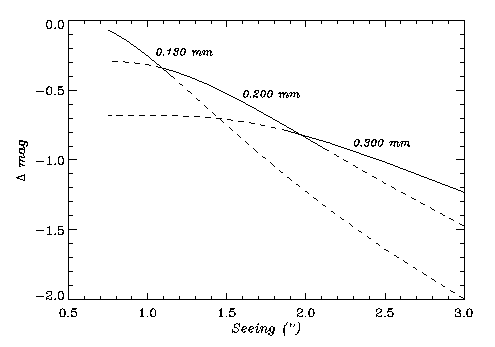
Light losses ¹
There are two main reasons that can produces light losses with FOCES
spectrograph. The size of the diaphragm at the Cassegrain focus compared
with actual seeing value and the slit width at the entrance of the
spectrograph.
Assuming a Gaussian seeing of fwhm  , an
entrance diaphragm of diameter
, an
entrance diaphragm of diameter  will
pass a fraction of the light of a pointsource according to
will
pass a fraction of the light of a pointsource according to

with light losses as follows :
 / /  |
0.50 |
0.75 |
1.00 |
1.25 |
1.50 |
1.75 |
2.00 |
F( )/F( )/F( ) ) |
0.159 |
0.323 |
0.500 |
0.661 |
0.790 |
0.880 |
0.938 |
 mag mag |
-2.00 |
-1.23 |
-0.75 |
-0.45 |
-0.26 |
-0.14 |
-0.07 |
The spectrograph slit instead cuts out a rectangular cross-section of
width  of the entrance aperture
diameter
of the entrance aperture
diameter  , where now
, where now

and  =
=  /
/  . Note that there is not
light loss when
. Note that there is not
light loss when  >
>
 .
.
Since  determines the
spectral resolution , the transfer of photons through the fibre system
is controlled by the product of the two formulae above. Thus, for a given
spectral resolution there are three ranges of seeing that require a
particular choice of an optimal entrance aperture as shown in next figure.
determines the
spectral resolution , the transfer of photons through the fibre system
is controlled by the product of the two formulae above. Thus, for a given
spectral resolution there are three ranges of seeing that require a
particular choice of an optimal entrance aperture as shown in next figure.

Note that the use of the diaphragm with 130 µ diameter is only suggested
for a seeing below 1 arcsec. The larger diaphragms (200 or 300 µ ) are
considerably better for medium or bad seeing.
1.- From M. Pfeiffer et al. Astronomy and Astrophysics 1998, 130-381.
Santos Pedraz Marcos
Last modified: Tue Aug 29 16:52:13 WET DST 2000




